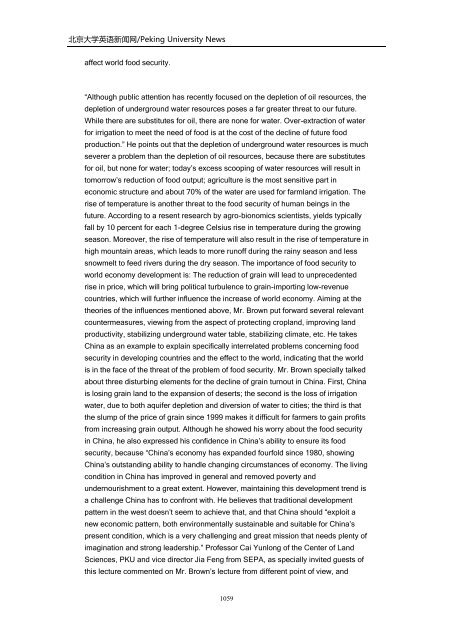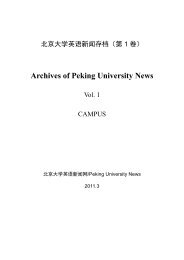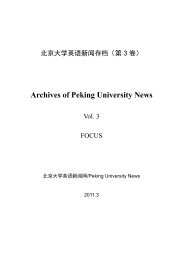Archives of Peking University News - PKU English - 北京大学
Archives of Peking University News - PKU English - 北京大学
Archives of Peking University News - PKU English - 北京大学
Create successful ePaper yourself
Turn your PDF publications into a flip-book with our unique Google optimized e-Paper software.
<strong>北京大学</strong>英语新闻网/<strong>Peking</strong> <strong>University</strong> <strong>News</strong><br />
affect world food security.<br />
―Although public attention has recently focused on the depletion <strong>of</strong> oil resources, the<br />
depletion <strong>of</strong> underground water resources poses a far greater threat to our future.<br />
While there are substitutes for oil, there are none for water. Over-extraction <strong>of</strong> water<br />
for irrigation to meet the need <strong>of</strong> food is at the cost <strong>of</strong> the decline <strong>of</strong> future food<br />
production.‖ He points out that the depletion <strong>of</strong> underground water resources is much<br />
severer a problem than the depletion <strong>of</strong> oil resources, because there are substitutes<br />
for oil, but none for water; today‘s excess scooping <strong>of</strong> water resources will result in<br />
tomorrow‘s reduction <strong>of</strong> food output; agriculture is the most sensitive part in<br />
economic structure and about 70% <strong>of</strong> the water are used for farmland irrigation. The<br />
rise <strong>of</strong> temperature is another threat to the food security <strong>of</strong> human beings in the<br />
future. According to a resent research by agro-bionomics scientists, yields typically<br />
fall by 10 percent for each 1-degree Celsius rise in temperature during the growing<br />
season. Moreover, the rise <strong>of</strong> temperature will also result in the rise <strong>of</strong> temperature in<br />
high mountain areas, which leads to more run<strong>of</strong>f during the rainy season and less<br />
snowmelt to feed rivers during the dry season. The importance <strong>of</strong> food security to<br />
world economy development is: The reduction <strong>of</strong> grain will lead to unprecedented<br />
rise in price, which will bring political turbulence to grain-importing low-revenue<br />
countries, which will further influence the increase <strong>of</strong> world economy. Aiming at the<br />
theories <strong>of</strong> the influences mentioned above, Mr. Brown put forward several relevant<br />
countermeasures, viewing from the aspect <strong>of</strong> protecting cropland, improving land<br />
productivity, stabilizing underground water table, stabilizing climate, etc. He takes<br />
China as an example to explain specifically interrelated problems concerning food<br />
security in developing countries and the effect to the world, indicating that the world<br />
is in the face <strong>of</strong> the threat <strong>of</strong> the problem <strong>of</strong> food security. Mr. Brown specially talked<br />
about three disturbing elements for the decline <strong>of</strong> grain turnout in China. First, China<br />
is losing grain land to the expansion <strong>of</strong> deserts; the second is the loss <strong>of</strong> irrigation<br />
water, due to both aquifer depletion and diversion <strong>of</strong> water to cities; the third is that<br />
the slump <strong>of</strong> the price <strong>of</strong> grain since 1999 makes it difficult for farmers to gain pr<strong>of</strong>its<br />
from increasing grain output. Although he showed his worry about the food security<br />
in China, he also expressed his confidence in China‘s ability to ensure its food<br />
security, because ―China‘s economy has expanded fourfold since 1980, showing<br />
China‘s outstanding ability to handle changing circumstances <strong>of</strong> economy. The living<br />
condition in China has improved in general and removed poverty and<br />
undernourishment to a great extent. However, maintaining this development trend is<br />
a challenge China has to confront with. He believes that traditional development<br />
pattern in the west doesn‘t seem to achieve that, and that China should ―exploit a<br />
new economic pattern, both environmentally sustainable and suitable for China‘s<br />
present condition, which is a very challenging and great mission that needs plenty <strong>of</strong><br />
imagination and strong leadership.‖ Pr<strong>of</strong>essor Cai Yunlong <strong>of</strong> the Center <strong>of</strong> Land<br />
Sciences, <strong>PKU</strong> and vice director Jia Feng from SEPA, as specially invited guests <strong>of</strong><br />
this lecture commented on Mr. Brown‘s lecture from different point <strong>of</strong> view, and<br />
1059




